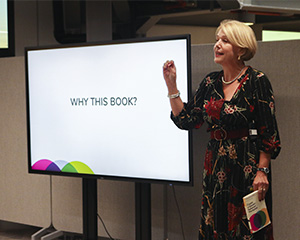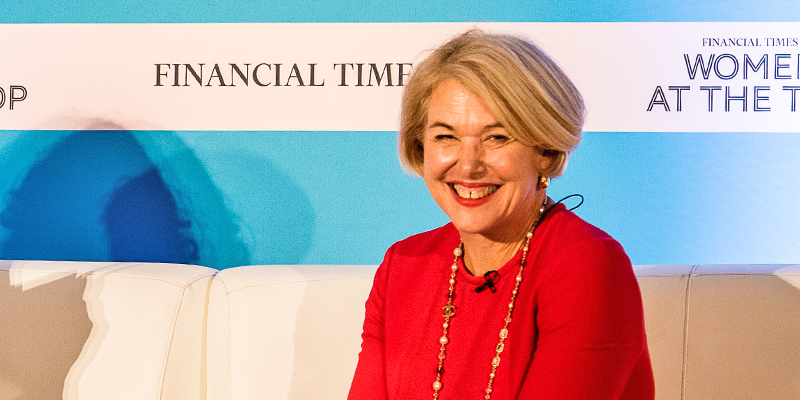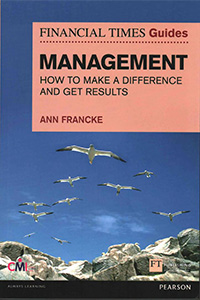Ann Francke OBE is chief executive of the Chartered Management Institute, the UK’s leading professional body for management and leadership with a global member community of over 150,000. She started her career at Procter & Gamble and has previously held senior executive positions at Mars, Boots, Yell and BSI, and today holds several board positions and five honorary doctorates for her work in management and leadership. Ann is an expert on gender balance in the workplace and in 2020 was awarded an OBE for services to workplace equality, speaking frequently in the media and conferences on this and other management and leadership topics.

“In fact, the UN and others estimate that gender equality may have taken as much as a 15-year hit in terms of progress! At last count, the World Economic Forum said it was 207 years until we’ll have gender equality, so if we add another 15 years to that, you can see the ridiculousness of this problem.”
Turning managers into conscious leaders

I’m originally American so I still have an American passport as well as a British one. I grew up in New Jersey and went to university in California and New York City. I did my undergraduate degree at Stanford University and my graduate at Columbia University.
I then came to Europe to work for Procter & Gamble for 14 years and moved from there to be the European vice president at Mars. I was then in director and chief executive roles at a couple of FTSE 100s here in the UK, before I pivoted, having been the only the first and only woman in the C-suite, which I found a pretty lonely place.
That is why I pivoted my career towards social enterprise, as many women do. Therefore, for the last eight years, I’ve been chief executive of the Chartered Management Institute (CMI), where our mission is to take ‘accidental managers’ and turn them into conscious leaders.
Better managers mean better organisations
Better managers really make a difference in people’s lives. So, when we have great bosses that nurture us, challenge us, and support us, we do great work. When we don’t, the opposite happens. We develop all sorts of mental health problems, like anxiety and stress, that our performance suffers, so it’s really important how we lead and manage ourselves and others in our workplaces.
A varied role keeps work interesting
One of the things I love about my role at the CMI is it’s so varied. For example, today, I have been in communication with the Department for International Trade about taking part in a virtual UK trade showcase to Pakistan. We are getting involved internationally, I have been in dialogue with my team, working on our inputs into helping to grow schemes for small businesses, where I’m on the Advisory Council. We’re shaping our response with resources to help these small businesses to grow.
Later on today, I’ve got a team meeting that takes place every week where we review any impacts or pivots or changes we need to make because of COVID-19. Tonight, I’ve got a virtual event for Women in Defence where I’m a competition judge, and we’re announcing the winners!
So, as you can see, there’s a huge amount of variety to what I do every day, across a very broad spectrum of stakeholders. That keeps my work incredibly interesting.
Creating a gender-balanced workplace
A particular passion of mine is gender equality, I’ve even written a book called Create a Gender- balanced Workplace for the publisher, Penguin Business.

- Obviously my own personal career and experience of what it’s like when you have gender balance versus when you don’t. It’s much better when there is balance for everybody involved, including all the men.
- And we know, and the evidence is overwhelmingly supportive of this, that gender balance fuels better business results, a better culture, and higher employee engagement, again for everybody – for women as well as men.
A huge step backwards for gender equality
Here in the UK, pre-pandemic we were making some progress in terms of gender pay gap, albeit at a glacial pace. The UK pioneered a wonderful pay gap recording system that was very transparent because the results needed to be published. However, with the pandemic, we know that generally, equality has taken quite a knock.
There are a number of reasons for this, not just in the UK, but globally:
- Women have been 1.8 times more likely to lose their jobs;
- More women in this country are furloughed than men;
- A lot of women work in the particularly hard-hit sectors, such as hospitality and retail;
- Women, whilst they have been at home, are taking on the majority of the caring and household responsibilities – 60% more than men. This puts additional stress on them, no matter where they are in their careers.

Therefore, as we build back better, we really do need to build back more inclusive, because a lot of the industries that are being champions, such as fintech, green energy, and data, are industries where women and ethnic minorities are not present very much or at all at the moment.
We need to make very conscious efforts to be inclusive and get women into those industries as we recover from this pandemic, especially if they’ve lost their job in one of the harder hit sectors, such as hospitality or retail. There’s a lot to do.
In fact, the United Nations and others estimate that gender equality may have taken as much as a 15-year hit in terms of progress! At last count, the World Economic Forum said it was 207 years until we’ll have gender equality, so if we add another 15 years to that, you can see the ridiculousness of this problem.
Joining forces with WACL
Due to my prior experience with Procter & Gamble and Mars in senior leadership roles, I have been a member of Women in Advertising and Communication Leadership (WACL) for longer than I care to admit, I’m really coming up to about two decades.
WACL recently made the purpose of the club all about accelerating gender equality, which really spoke to me and, obviously, with all the work we do at CMI and the book I’ve written. I was also part of the Government’s Advisory Council for setting up the gender pay gap reporting. Therefore, when WACL pivoted their purpose, I said I was very delighted to become much more active in helping them to realise it.
So, Jackie Stevenson, President of WACL, asked me if I would lead a working group on what we could do to educate our fellow members and others outside the WACL community on why closing the gender pay gap is so important, what the business benefits are of doing so, and why transparency and reporting matters so much.
It was part of the programme to really educate all the women of WACL. These are senior women across very well-known brands and companies, such as Google, Facebook, Virgin, Vodafone, as well as some of the best-known advertising and communications agencies.
Obviously, they touch a lot of people, which makes it quite important to make them advocate for gender pay reporting. However, when we learned in March last year that the enforcement of gender pay gap reporting had been suspended, we felt we should do something about it. Therefore, Jackie and in her WACL campaigning mode suggested that we would start a petition, which I was very happy to support, and that we would also join forces with The Fawcett Society.
Extensions we want to see in gender pay gap reporting
Even if not solely as a result of our efforts, I like to think that we did contribute in encouraging the Equality and Human Rights Commission to be more forthright when they announced the reinstatement of the enforcement of gender pay gap reporting. This was announced last month with a six-month grace period, so enforcement action against firms who fail to report will start again on 5th October 2021.
Normally, all companies with 250 or more employees would have to report this by the end of April, but the deadline has been extended until October. However, that is a one-off and my understanding is that the companies will need to report by the end of April 2022.
We wanted to see the reporting requirement extended in order to include three additional things:
- Small and medium-sized enterprises (SMEs) reporting. Many countries, inspired in part by the UK programme, have instated gender pay reporting regimes or mechanisms. However, a lot of them go further than the UK and require companies of 50 or more employees to report.
- Mandatory action plans. It isn’t enough just to say: “Here’s my gender pay gap.” It should be: “Here’s my gender pay gap, and here’s what I’m doing about it.” I can’t reiterate enough that you will perform better in your organisation if you take steps to get gender-balanced throughout your organisation. So, this is a business issue, and with any businesses, you need an action plan, otherwise, you’re not going to address it.
- Consequences for those that don’t have action plans or make progress. I was delighted to read recently that the Financial Conduct Authority is mulling this over, because I do think this is a matter of business compliance as well. Getting the financial regulators involved will resonate more with business leaders and investors, and they are both very important stakeholders in galvanising companies to do more around this.
The time has come for society to do more about closing inequalities
We would also like to see ethnicity pay gap reporting made mandatory in the exact same way that gender pay gap reporting is mandatory. Our CMI members are overwhelmingly supportive of this. In fact, we recently surveyed them and 85% told us they were very supportive of gender pay gap reporting and 80% said they were supportive of ethnicity pay gap reporting. Therefore, I think people see that the time has come for us as a society to do more about closing these inequalities.
My work with WACL is still ongoing. We’ve had a number of coaching sessions on this topic. We’ll also be putting together a toolkit by the end of April to help everybody, no matter where they work, to inform themselves about this issue. There will be practical things and suggestions on what you can do to become a proactive ally in helping your own organisation deal with it. You have to be practical, otherwise, people don’t get it.
Growing our way out of the pandemic
There’s a lot that we’re doing at the moment at the CMI, as I’ve mentioned. I’m on the advisory council of the Chancellor’s Help to Grow campaign for small businesses, which is an outstanding programme that we really want to see work.
We also want to be actively contributing our CMI resources to help small businesses grow because most businesses in this country are small businesses, and enabling them to do things like pivot, embrace equality and diversity, as well as putting employee wellbeing more centrally as part of their strategy, and to develop effective communication will be key to growing our way out of the pandemic and making the UK a really productive and inclusive society.
Additionally, in April, we are launching in collaboration with the Management Consultancies Association (MCA) a Chartered Management Consultant Award (ChMC). We already have over 1500 chartered management consultants and we’ve been piloting it with over 23 firms, so it’s been a big hit. We’re delighted to be broadening that out with the support of lots of major consulting clients, including the government and some financial services and industries. It’s obviously available to everybody, whether you’re in a big consulting global consulting firm, or whether you’re an individual consultant.
Finally, we’ve learned during this pandemic how important it is to have a digital-first strategy. Therefore, we’ll be building on that, and complementing and augmenting our resources for our members and for our other stakeholders, with lots more exciting digital resources, like online communities, diagnostic tools, and CPD. But of course, like many people, we are also eager to get back to a situation where we can also meet up in person as well as carry on digitally.
Ann is also the author of The Financial Times Guide to Management.
https://www.linkedin.com/in/ann-francke-obe-a1a87546/
https://twitter.com/cmi_managers
Stanford University image credit:
By King of Hearts / Wikimedia Commons / CC-BY-SA-3.0, CC BY-SA 3.0






